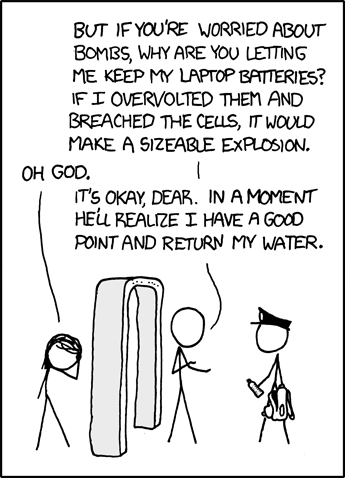I have two cases to point to to prove this point.
The first involves a group who, after learning that their initial 9.6V RC car battery would not take any significant load from the motors, wired a test circuit to their breadboard and hooked up a battery. Without fully understanding the implication of wiring two motors worth of leads into the power rails of their breadboard, they quickly began melting the electrical tape and plastic shrinkwrap right off of that battery.
Now I want to pause here to point out the series of events that goes on when you light a battery on fire.
 |
| image from youtube |
First, you wire something incorrectly, and often innocently, into your breadboard and plug in your battery.
Second, you sit at your workbench puzzled as to why the circuit didn't function.
Third, you smell smoke and an unmistakable stench of burning plastic.
Fourth, you flip your robot over, see smoke, and immediately disconnect the power source to prevent a battery explosion.
Fifth, you look at your wiring, decide which wires are touching or mis-wired that shouldn't be, and remove the problem.
My students, unfortunately, added a sixth step; they wired in a new battery to see if that was the problem.
So, long story short, two of my batteries are now in a questionable state; though the students did succeed in making the robot do doughnuts on the floor once they fixed the problem...with their third battery.
 |
| Image from xkcd.com |
This first question is important because it allows you to undergo a line of thinking that asks, "if A,B,C and D are wrong, which one can I test the most easily and without causing harm to me, first, or to my project, second...hopefully.
This ability to think abstractly and elaborate on potential problems is one that I have not spent enough time helping the students develop. It is one that we will spend some time on tomorrow.
The second story is one that is far more academic, far more moot, and far more enlightening.
This one involves a student who is rushing through everything. We have all had this student at some point in a teaching career and have probably been frustrated by trying to slow them down.
 |
| Image from The Matrix: Reloaded |
Now as someone who has been barreling down that roadway, cars, trucks and other assorted debris in tow, I can safely say that the easiest way to get me to slow down is not to try and convince me to explore the area with words, but to drop a building in my way and force me to explore as I go around.
This is where effective task design comes into play and I believe, at first glance at least, that this unit has thrown an effective number of concrete structures in the way of the end-goal. This was very apparent today when I pointed out the connection between the 5V input on the line sensor schematics, and the 5V regulator chip that happened to be added to their robotics bag. It also seemed to resonate with my Neo-like student when I slowly ran through the list of questions that the assignment asks him to answer before he actually hooks anything up (for fear of burning batteries, of course).
 |
| Image from en.wikipedia.org |
I feel a fair bit of sadness to say that this student, who I've had so much fun watching progress from a teacher-centred learner to a more student-centred problem solver will no longer feature on this blog as he announced to say that he is moving to British Columbia at the end of the week.
I wish him all the best on the left coast and I hope that he takes at least a degree of the Elaborative thinking from robotics class with him in whatever he does.
Here's hoping that no batteries are lit on fire tomorrow.
No comments:
Post a Comment